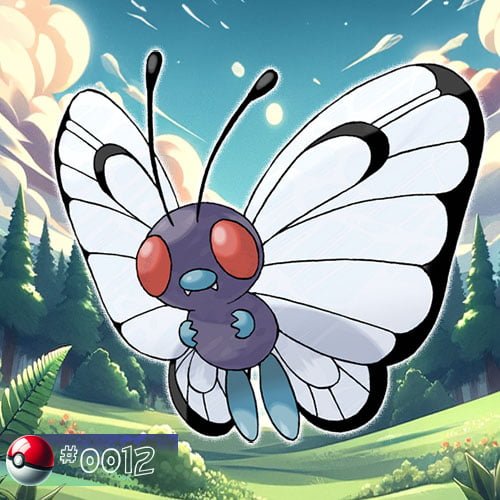Metapod

| National Pokedex No: 0011 |
| Type: |
| Category: Cocoon Pokémon |
| Height: 0.7 m (2′04″) |
| Weight : 9.9 kg (21.8 lbs) |
| Gender: 50% ♂, 50 % ♀ |
| Abilities/Hidden abilities:Shed Skin |
Biology
Physical Characteristics
Metapod is the evolved form of Caterpie and the transitional stage before it transforms into Butterfree.
Metapod takes on the appearance of a chrysalis or cocoon. Its exterior is hard and protective, serving as a shield during its metamorphic process. Metapod is generally green, mirroring the color of Caterpie. Its exterior is solid and resistant, providing enhanced defense.
Metapod lacks visible limbs or features, as it remains relatively dormant and immobile during this stage of evolution. Metapod is larger than Caterpie, reflecting the growth and changes occurring within as it prepares for the final stage of evolution.
Although Metapod appears dormant, its eyes are visible through its protective shell, indicating a level of awareness despite its immobile state.
Metapod’s physical characteristics showcase the transitional phase in a Pokémon’s life cycle, highlighting its resilience and defensive adaptations before the final metamorphosis into a fully-fledged Butterfree.
Behaviour
Metapod, is known for its limited and specific behaviors.
Metapod is largely immobile during this stage of evolution. Its primary function is to serve as a protective shell while undergoing metamorphosis into its final form, Butterfree.
Metapod’s hard, cocoon-like exterior acts as a robust defense mechanism against potential threats. This defensive strategy allows it to withstand attacks while undergoing the transformative process.
Metapod’s behavior revolves around preparing for the upcoming metamorphosis into Butterfree. While immobile, it undergoes internal changes and growth that will eventually result in a more evolved and capable Pokémon.
Metapod typically attaches itself to tree branches or other surfaces in its surroundings. This stationary behavior aids in camouflage and protection, allowing it to blend into the environment while undergoing its transformation.
Despite its seemingly dormant state, Metapod exhibits a level of awareness. It can perceive its surroundings through its protective shell, enabling it to respond to environmental stimuli and potential dangers.
In summary, Metapod’s behaviors are focused on self-defense, metamorphic preparation, and environmental adaptation as it undergoes the crucial transition.
Evolution
Metapod’s evolution is a pivotal stage in the life cycle of Pokémon within the Caterpie evolutionary line
Metapod is the second evolutionary stage in the line that begins with Caterpie. The evolutionary progression is Caterpie → Metapod → Butterfree.
The evolution from Caterpie to Metapod is a natural and necessary part of the life cycle. Caterpie undergoes this transformation as it matures and accumulates the energy needed for its next evolutionary stage at level 7.
Metapod represents the cocoon or chrysalis stage in the evolutionary process. During this stage, Caterpie undergoes significant internal changes, both in terms of physiology and appearance.
Metapod is characterized by its immobile state. It remains stationary, usually attached to surfaces such as tree branches or leaves. This lack of mobility is compensated by the protective nature of its hard shell, providing defense against potential predators.
Metapod evolves into Butterfree when the Pokémon reaches a certain level of growth and development at level 10. The trigger for evolution is typically linked to factors like experience gained in battles or the passage of time.
The eventual evolution into Butterfree marks the final stage of this metamorphic process. Butterfree emerges with enhanced abilities, expanded wings, and the capability to use powerful techniques, making it a more formidable Pokémon compared to its previous stages.
Metapod gains certain moves during its time as a Pokémon. These moves contribute to its skill set and can influence its effectiveness in battles.
In essence, Metapod’s evolution is a transformative journey, with the Pokémon undergoing critical changes to prepare for its adult form as the elegant and flying Pokémon, Butterfree.
Appearances
Anime Main Appearances
Ash’s Metapod:
Ash catches Caterpie in “Ash Catches a Pokémon” (Episode 4). Caterpie evolves into Metapod in “Challenge of the Samurai” (Episode 4). This evolution occurs as part of Caterpie’s natural progression in its life cycle.
Metapod also made an appearance in “I Choose You!”, part of a separate continuity from the main series. It evolved from Caterpie during a battle with a Pinsir and later transformed into Butterfree after another battle against a group of Primeape.
Other appearances include:
- In “Challenge of the Samurai” Samurai’s Metapod battled Ash’s Metapod, resulting in a prolonged Harden-only battle that was interrupted by a swarm of Beedrill.
- Bugsy used a Metapod during his Gym battle against Ash in “Gettin’ The Bugs Out”. It faced Chikorita and Pikachu, using Tackle unlike most Metapod, but was defeated by Pikachu’s Thunderbolt. Several Metapod were also seen inside Azalea Gym during the episode.
- In “Caterpie’s Big Dilemma” Zander’s Metapod became giant after consuming enhanced Rare Candies. It evolved from a Caterpie, later knocking down part of a radio tower to create space for its evolution into Metapod, and eventually evolving into Butterfree.
- In “Butterfree and Me!” multiple Metapod evolved into Butterfree on Wayfarer Island. One Metapod, originally befriended by Ash as a Caterpie, evolved into Butterfree with Ash’s help.
Anime Minor Appearances
During the episode “Celebi: The Voice of the Forest” Ash and Sam observed several Metapod undergoing evolution into Butterfree.
Other appearances of Metapod include:
- One in “The Breeding Center Secret”;
- Found among Bug-type Pokémon on Murcott Island in “Tracey Gets Bugged”;
- Seen as a wild Pokémon in “Pikachu’s Rescue Adventure”;
- Created as an illusion in “Illusion Confusion!” by Haunter and Gengar;
- Owned by the Pokémon Trainers’ School in “Gonna Rule The School!” loaned to a student temporarily;
- Appeared in “Riding the Winds of Change!” and “Volcanion and the Mechanical Marvel”.
Metapod was also seen in:
- “Lillie’s Egg-xhilarating Challenge!” and “The Ol’ Raise and Switch!” in Lillie’s garden;
- “I Choose Paradise!” at the Pokémon Paradise Resort;
- “Securing the Future!” aiding Alola in showering Necrozma with light;
- “The Battlefield of Truth and Love!” observing Bewear and Stufful’s performance;
- Caught by Goh in “Working My Way Back to Mew!” and featured subsequently in “Pokémon Journeys: The Series”;
- Evolving into Butterfree in “Not Too Close for Comfort!” as seen in a video.
- Appearing in “Take My Thief! Please!” and evolving into Butterfree in “Heroes Unite!”;
- Also appearing in “HZ047”.
Manga Appearances
The Electric Tale of Pikachu
In “Play Misty For Me,” Ash’s Caterpie underwent evolution into Metapod. This particular Metapod was illustrated as slightly slimmer than others and featured a prominent spike on its back.
How I Became a Pokémon Card
In this manga, Midori was depicted as having a Metapod.
Magical Pokémon Journey
In the chapter “Clefairy Comes Through,” a Metapod descended from a tree. Despite Hazel’s attempts to return it to its original position, the Metapod fell again.
Pokémon Adventures
“Bulbasaur, Come Home!” introduced Metapod as one of the Pokémon that fled Professor Oak’s Laboratory. Yellow’s Caterpie, nicknamed “Kitty,” briefly evolved into Metapod and subsequently into Butterfree during a confrontation with Lance.
Bugsy, the Gym Leader of Azalea Town, possessed two Metapod on his team. One made its debut in “Into the Unown,” and both were seen in “Ursaring Major” when they visited Azalea Town’s well.
A wild Metapod made an appearance in the Wild Area in “Zap!! A Rising Beam of Light.”
According to the Volume 1 Pokédex, it seems Red captured a Caterpie that evolved into Metapod and later into Butterfree.
Pokémon Gold & Silver: The Golden Boys
Bugsy’s Butterfree was initially showcased as a Metapod in “Let’s Aim For The Goal!” before evolving prior to the events of “Gold And Black VS. Team Rocket.”
Pokémon Gotta Catch ‘Em All
This manga featured a Metapod in “Shu and Pikachu’s Debut!” as well as in ”Shu’s Christmas”, the twenty-third chapter of the Pokémon Gotta Catch ‘Em All manga (GDZ23).
Pokémon Pocket Monsters
Bugsy’s Metapod made an appearance in “Demanding Tests at the Pokémon School!” before evolving into a Butterfree.
Game data
Stats
Location
| Game version | Location |
|---|---|
| Pokémon Red | Routes 25, Viridian Forest |
| Pokémon Blue | Route 24, 25, Viridian Forest |
| Pokémon Yellow | Viridian Forest |
| Pokémon Gold | Route 2, 26, 27, 30, 31, 34, 35, 36, 37, 38, 39, Azalea Town, Ilex Forest, Lake of Rage, National Park |
| Pokémon Silver | National Park (Bug-Catching Contest) |
| Pokémon Crystal | Route 24, 25, Ilex Forest, National Park (Bug-Catching Contest) |
| Pokémon Ruby and Pokémon Sapphire | Trade |
| Pokémon FireRed and Pokémon LeafGreen | Routes 24 and 25, Viridian Forest, Pattern Bush |
| Pokémon Emerald | Trade |
| Pokémon Colosseum | Trade |
| Pokémon XD: Gale of Darkness | Trade |
| Pokémon Diamond and Pokémon Pearl | Eterna Forest |
| Pokémon Platinum | Eterna Forest |
| Pokémon HeartGold | Route 2, 30, 31, 47, Ilex Forest, National Park, Viridian Forest |
| Pokémon SoulSilver | National Park (Bug-Catching Contest) |
| Pokémon Black | Trade |
| Pokémon White | Route 12 |
| Pokémon Black 2 | Trade |
| Pokémon White 2 | Evolve Caterpie |
| Pokémon X | Evolve Caterpie |
| Pokémon Y | Santalune Forest |
| Pokémon Omega Ruby and Pokémon Alpha Sapphire | Trade |
| Pokémon Sun and Pokémon Moon | Route 1 (Alola), Route 5 (Alola), Lush Jungle, Melemele Meadow |
| Pokémon Ultra Sun Pokémon Ultra Moon | Route 5, Melemele Meadow, Lush Jungle |
| Pokémon: Let's Go, Pikachu! and Pokémon: Let's Go, Eevee! | Viridian Forest |
| Pokémon Sword and Pokémon Shield | Rolling Fields, Bridge Field, Dappled Grove, Rolling Fields, South Lake Miloch |
| Pokémon Brilliant Diamond | Evolve Caterpie |
| Pokémon Shining Pearl | Trade |
| Legends Arceus | Unobtainable |
| Pokémon Scarlet and Pokémon Violet | Unobtainable |
Metapod's origin name
Metapod, the Pokémon known for its transitional stage between Caterpie and Butterfree, has an interesting origin name across different languages.
English: The English name “Metapod” is derived from a combination of “metamorphosis” and “pod.” The term “metamorphosis” refers to the biological process of transformation, aligning with Metapod’s role in Caterpie’s evolution.
Japanese: In Japanese, Metapod is known as “トランセル” (Toranseru). This name seems to be a combination of “transformation” (トランス, Toransu) and “shell” (シェル, Sheru), emphasizing its cocoon-like form.
French: The French name for Metapod is “Chrysacier.” This name draws inspiration from the word “chrysalis,” which is the pupal stage of butterflies, aligning with Metapod’s cocoon-like appearance.
German: In German, Metapod is called “Safcon.” This name doesn’t have an obvious connection to its cocoon form. However, it might be a combination of “safe” or “safety” (Sicherheit) and “cocoon.”
Spanish: The Spanish name for Metapod is “Metapod.” The name remains consistent with the English version, emphasizing the universal recognition of this Pokémon’s transitional stage.
Italian: In Italian, Metapod retains its English name, being called “Metapod.” This consistency in naming is common in many Pokémon species across various European languages.
Korean: The Korean name for Metapod is “단데” (Dande), which seems to be a transliteration of its Japanese name “Toranseru.”
Chinese (Simplified): In Simplified Chinese, Metapod is known as “蛹精灵” (Yǒng Jīnglíng), where “蛹” (Yǒng) means pupa or cocoon, reflecting its metamorphic state.
Chinese (Traditional): In Traditional Chinese, Metapod is also called “蛹精靈” (Yǒng Jīnglíng), with the same characters conveying the concept of a pupa or cocoon.
These name variations showcase the linguistic creativity in capturing Metapod’s essence as a transitional stage in the evolution of Pokémon.




